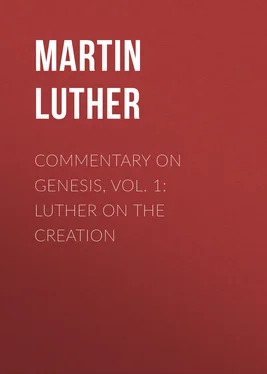Martin Luther - Commentary on Genesis, Vol. 1 - Luther on the Creation
Здесь есть возможность читать онлайн «Martin Luther - Commentary on Genesis, Vol. 1 - Luther on the Creation» — ознакомительный отрывок электронной книги совершенно бесплатно, а после прочтения отрывка купить полную версию. В некоторых случаях можно слушать аудио, скачать через торрент в формате fb2 и присутствует краткое содержание. Жанр: foreign_prose, foreign_religion, Философия, foreign_psychology, foreign_antique, на немецком языке. Описание произведения, (предисловие) а так же отзывы посетителей доступны на портале библиотеки ЛибКат.
- Название:Commentary on Genesis, Vol. 1: Luther on the Creation
- Автор:
- Жанр:
- Год:неизвестен
- ISBN:нет данных
- Рейтинг книги:4 / 5. Голосов: 1
-
Избранное:Добавить в избранное
- Отзывы:
-
Ваша оценка:
- 80
- 1
- 2
- 3
- 4
- 5
Commentary on Genesis, Vol. 1: Luther on the Creation: краткое содержание, описание и аннотация
Предлагаем к чтению аннотацию, описание, краткое содержание или предисловие (зависит от того, что написал сам автор книги «Commentary on Genesis, Vol. 1: Luther on the Creation»). Если вы не нашли необходимую информацию о книге — напишите в комментариях, мы постараемся отыскать её.
Commentary on Genesis, Vol. 1: Luther on the Creation — читать онлайн ознакомительный отрывок
Ниже представлен текст книги, разбитый по страницам. Система сохранения места последней прочитанной страницы, позволяет с удобством читать онлайн бесплатно книгу «Commentary on Genesis, Vol. 1: Luther on the Creation», без необходимости каждый раз заново искать на чём Вы остановились. Поставьте закладку, и сможете в любой момент перейти на страницу, на которой закончили чтение.
Интервал:
Закладка:
With reference to the future life, some here inquire whether the offices of these heavenly bodies are designed of God to cease. But the life to come will be without time. For the godly will enjoy an eternal day and the ungodly will have an endless night and eternal darkness.
The sun therefore makes the day, not only by his light and brightness, but by his motion, which he makes from east to west until he rises again at the end of 24 hours and thus makes another day. Wherefore astronomers make three great benefits to proceed from the sun: his motion, his light and his influence.
Concerning his influence however I shall enter upon no subtle inquiry. It is enough for me to know that these heavenly bodies were created for our use; that they may be unto us "For signs of wrath or of grace and for seasons," that we might observe certain distinctions of time, etc. These things, because they are taught us in the Holy Scriptures are sure. All things else, such as the doctrines and predictions of astrologers, are not thus certain.
One is wont to inquire here concerning the astrological predictions which some confirm and prove from this text. If they are not defended perseveringly and pertinaciously, I will not combat them strongly. For one ought to concede to the ingenious and learned brains their playground. Therefore when one reads of the misuse and unbelief of their superstitions, I would not be greatly offended if one exercise himself in these predictions for the sake of pleasure.
As to that which pertains to the practice of astrology I could never he persuaded to count astrology among the sciences, for the reasons that it has no clear demonstration or visible proof. That they cite experiences does not influence me. For all astrological experiences are merely particular. For those, skilled in the practice only, have observed and committed to writing the things that have not failed; the other experiences, however, in which they failed or were not followed by the results they predicted would certainly follow were not committed to writing nor remembered. But just as Aristotle says that one swallow alone does not make summer, so I think one cannot form a true and complete science from such single and particular observations. For just as it is said of hunters, they may hunt every day, but they do not find game every day. The same may be said of astrologers and their predictions, because they fail very often.
But now since they indeed contain some truth, what folly it is at the same time that one should be so anxious about the future. For grant that it is possible to know the future through the predictions of astrologers, were it not in many respects far better, if they are evil, to be entirely ignorant of them than to know them, as Cicero contends? Instead it is much better to stand in the fear of God always and to pray than to be tormented and tortured by the fear of future events. But more of this at another time.
Wherefore my judgment is that astrological predictions cannot safely and satisfactorily be founded upon this passage of Scripture; for they are, as I have said, signs observed and collected by reason. But the next and proper meaning, if we understand Moses concerning the signs, which God knows and shows, is to the end that men in general may be admonished and terrified by them. Let these observations on the fourth day suffice.
Now here begins to open upon us and to present itself to our meditation that great subject, the immortality of the soul. For no creature besides man can understand the motion of the heaven or estimate the celestial bodies and their revolutions. The pig, the cow, the dog cannot measure the water they drink. But man can measure even the heaven and form his calculations of all the heavenly bodies.
Wherefore a spark of eternal life glitters forth here from the fact that man is naturally exercised in this knowledge of all nature. For this anxious inquiry indicates that men were not created with the design that they should live forever in this small weak portion of God's universe; but that they should occupy the heaven, which in this life they so admire and in the study and contemplation of which they are continually engaged.
If heaven were not the destination of man what aim or need was there for his being endowed with this wide capacity for rich knowledge and thought. Indeed the stature and form of the body of man also argues that he was designed for heavenly things, even though his origin was so very mean and humble. For God made the first man from the common earth. After this the human race began to be propagated from the seed of the male and female, in which the embryo is formed in the womb in all its particular members, and there it grows until by its birth it is ushered forth into the light of heaven. From this birth comes the life of sensation, the life of motion and the life of operation.
When at length the body has grown and the man has a sound reason and soul in a sound body, then first shines forth in all its brightness that life of intelligence found in no other earthly creature. By this faculty, leaning on the aid of the mathematical sciences, which no one can deny were indicated and taught from above, man mounts in his mind from earth to heaven, and leaving behind him the things below concerns himself about and inquires into heavenly things. Hogs do not do this, nor cows nor any other beasts of the earth, it is the employment of man alone. Man therefore is a being created of God with the design that at an appointed time he should leave the earth, dwell in heavenly mansions and live a life eternal. These great principles of man's creation form the reasons why he is able not only to speak and to judge, which are things pertaining to language and argument, but is capable also of acquiring any science whatever.
From this fourth day therefore begins to be manifested the peculiar glory of our race. Because God here forms his mind and purpose to create such a being as should be capable of understanding the motions of those heavenly bodies, which are created on this fourth day; and a being who should delight himself in their knowledge, as peculiarly and exclusively adapted to his nature. All these things therefore ought to call forth our thanksgiving and praise; while we reflect that we are the citizens of that heavenly country which we now behold, understand and wonder at, yet understand only as strangers and exiles, but which after this life we shall behold nearer and understand perfectly.
Hitherto therefore we have heard the divine historian speak of those creatures only, which are endowed with neither life nor sense; although some philosophers have spoken of the stars and the greater heavenly bodes, as if they were animate and rational. This I think has arisen from the motion of these bodies, which is rational and so certain that there is nothing like it in any other creatures. Hence some philosophers have affirmed that the heavenly creatures were composed of body and intellect, though their bodies were not material. Plato reasons thus in his "Timoeus."
All such opinions however are to be utterly exploded and our whole intellect is to be subjected to the Word of God and to what is there written. The Holy Scriptures plainly teach that God made all these things, that he might by them prepare for the man, whom he was about to create, a home and a hospitable reception; and that all these things are governed and preserved by the power of the same Word, by which they were originally created. Wherefore all things being at length prepared pertaining to the furniture of his home, the Scriptures next show us the manner in which man was "formed" and introduced into his possession to the end that we might be taught that the providence of God over us and for us is greater than all our own care and concern for ourselves can possibly be. These things are plainly taught us in the Scriptures. All other things not supported by the authority of the Scriptures are to be repudiated and rejected.
Читать дальшеИнтервал:
Закладка:
Похожие книги на «Commentary on Genesis, Vol. 1: Luther on the Creation»
Представляем Вашему вниманию похожие книги на «Commentary on Genesis, Vol. 1: Luther on the Creation» списком для выбора. Мы отобрали схожую по названию и смыслу литературу в надежде предоставить читателям больше вариантов отыскать новые, интересные, ещё непрочитанные произведения.
Обсуждение, отзывы о книге «Commentary on Genesis, Vol. 1: Luther on the Creation» и просто собственные мнения читателей. Оставьте ваши комментарии, напишите, что Вы думаете о произведении, его смысле или главных героях. Укажите что конкретно понравилось, а что нет, и почему Вы так считаете.












